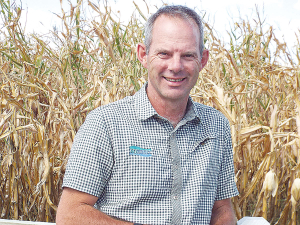Early drought fears ease in Hawke’s Bay, but caution remains
Fears of a serious early drought in Hawke’s Bay have been allayed – for the moment at least.
 James Allen, Ag First, is predicting the season may end three to four weeks earlier than normal for some Waikato farmers.
James Allen, Ag First, is predicting the season may end three to four weeks earlier than normal for some Waikato farmers.
A leading farm consultant says it's likely the dairy season in the Waikato will come to a premature end because of the drought.
James Allen, Ag First, is predicting the season may end three to four weeks earlier than normal as the situation gets tight for dairy farmers in that region.
He says while most of the region had about 20mm of rain recently, which was very welcome, it certainly wasn't enough to be a drought breaker. He says although more rain is expected, that will not change the situation much.
"There isn't much feed at all and it's still dry. What is keeping farmers going is that maize crops are pretty good with some quite good yields coming off. Any spare maize that wasn't contracted has now been taken," he says.
Allen says around central and south Waikato it's very dry but in the hill towards Te Aroha some farmers report that they have 80mm of rain.
"But only a few pockets of the region have got lucky," he says.
Allen says dairy farmers in the region are generally coping pretty well compared to previous droughts as they are resilient and are just getting on with it. He says this is because the payout is high and they have had a lot of supplement on hand - prices for which have held and not gone crazy.
Allen says crunch time is looming and decisions on the culling of cows and drying off will be made from now on. He says people have been poking a lot of supplement into their cows and kept on milking but says the maths on this are really not working out.
"It's about focusing on next season so protecting pastures and cow condition is now the priority," he says.
Allen says farmers should be turning their minds to 2026 and working out the amount of supplement and pasture cover they have and set targets for the next season.
For dairy farmers generally in the main north island regions of Northland, Waikato and Taranaki the drought has taken its toll with the extreme dry weather. But Allen says down in Canterbury they are having an amazing season and he says Southland has also recovered well.
Federated Farmers has confirmed interim chief executive Mike Siermans to the role.
Registrations are now open for the 2026 Ruralco Golf Classic, with all proceeds from the event set to support the Mid Canterbury Rural Support Trust.
Mating wrapped up last month at the across-breed Beef Progeny Test on Pāmu’s Kepler Farm in Manapouri.
Libby Judson is a keeper of memories from an age gone by. Tim Fulton tells her story.
A New Zealand-first native tree study has highlighted the Bioeconomy Science Institute's position as a forestry research leader.
Hemp fibre processor Rubisco is relocating its core processing facility to Ashburton as part of a $20-$30 million expansion to leverage what it says is an accelerating global demand for sustainable and renewable fibres.
President Donald Trump’s decision to impose tariffs on imports into the US is doing good things for global trade, according…
Seen a giant cheese roll rolling along Southland’s roads?